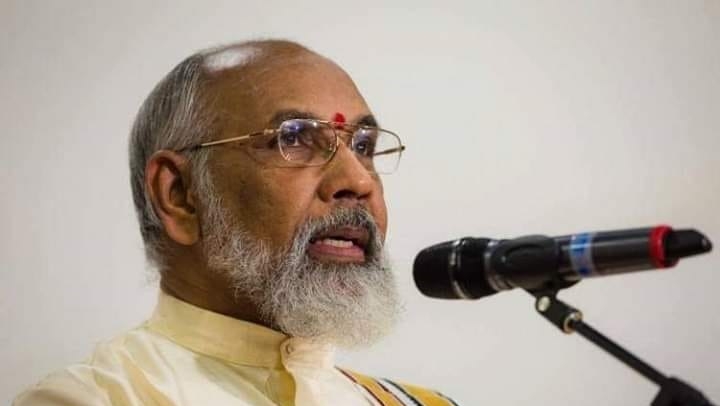Sri Lanka reconciliation: Vigneswaran backs president, wants monks not to interfere

Sri Lanka President Ranil Wickremesinghe has a clear vision for the country which must be supported and the Buddhist clergy must stay out of the reconciliation process, Jaffna district MP and former Northern Province Chief Minister C V Vigenswaran said.
Responding to questions by reporters on his way out of parliament on Wednesday February 08, Vigneswaran said he approved of the president’s throne speech delivered that morning.
“I welcome it,” he said.
In his speech, President Wickremesinghe reiterated a pledge to fully implement the 13th amendment to the constitution, which has drawn fiery opposition from nationalist Buddhist monks.
However, Vigenswaran noted that the 13th amendment is not the solution to Tamil grievances.
“In a unitary state, the government carries out the will of the majority community,” he said, adding that as former chief minister of the northern province, he personally experienced how the central government made it impossible for the council to function independently.
“Our goal is a federal solution, but we do think it will be a good thing to fully implement 13th amendment as it currently exists,” he said.
A group of nationalist monks had gathered outside the parliament complex Wednesday morning protesting the proposed implementation of the 13th amendment.
A video of one of the monks setting fire to a copy of the amendment was widely circulated.
Asked to comment on the monks’ protest, Vigenswaran likened it to a similar incident in 1958 when a group of monks forced then Prime Minister S W R D Bandaranaike to abrogate an agreement reached with Illankai Tamil Arasu Kachchi (ITAK) leader S J V Chelvanayagam. The pact was on the creation of a series of regional councils to provide a level of autonomy to the Tamil minority.
Bandaranaike famously tore the agreement to pieces after vehement protest by the monks.
“Aiyo, it was the monks that in 1958 did the same thing and created a problem,” said Vigneswaran.
“Monks must not interfere with these things. They think they alone can save the country and give good [unclear] to the country,” said the MP.
Vigneswaran said he plans to write an open letter to the country’s chief Buddhist prelates on the matter in due course. He claimed that not all Buddhist monks are opposed to the 13th amendment and that some priests who visited Jaffna recently had even said a solution to the conflict should go beyond it.
“We will not turn back until we have obtained a federal solution,” he added.
President Wickremesinghe has repeatedly stated that he plans a full implementation of the amendment.
The 13th amendment to Sri Lanka’s constitution emerged from the controversial Indo-Lanka Accord of 1987 as a purported solution to the worsening ethnic conflict, four years after war broke out. Provincial councils came in the wake of this amendment, though land and police powers have yet to be devolved to the provinces as originally envisioned. Both Sinhalese and Tamil nationalists have historically opposed the amendment, the former claiming it devolved too much, the latter complaining it didn’t devolve enough.
A full implementation of the amendment will see land and police powers devolved to the provinces, a development that is not likely to garner support from Sri Lanka’s more nationalist-oriented parties including sections of the ruling Sri Lanka Podujana Peramuna (SLPP).
Federalism has been a highly controversial and politically inflammable idea in Sri Lanka over the years, with many nationalist or even some moderate parties in the south vehemently opposing the very suggestion of it. It is unclear whether this stance has softened over the 13 years since the end of the war, but to date no Sinhalese-dominated party has come out in support for it. (Colombo/Feb08/2023)
